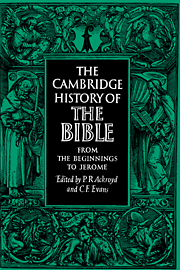Book contents
- Frontmatter
- I LANGUAGE AND SCRIPT
- II BOOKS IN THE ANCIENT WORLD
- III THE OLD TESTAMENT
- IV THE NEW TESTAMENT
- V THE BIBLE IN THE EARLY CHURCH
- 13 BIBLICAL EXEGESIS IN THE EARLY CHURCH
- 14 ORIGEN AS BIBLICAL SCHOLAR
- 15 THEODORE OF MOPSUESTIA AS REPRESENTATIVE OF THE ANTIOCHENE SCHOOL
- 16 JEROME AS BIBLICAL SCHOLAR
- 17 AUGUSTINE AS BIBLICAL SCHOLAR
- 18 THE PLACE OF THE BIBLE IN THE LITURGY
- Bibliography
- Abbreviations
- Notes on the Plates
- Indexes
- Plate Section">
- References
17 - AUGUSTINE AS BIBLICAL SCHOLAR
from V - THE BIBLE IN THE EARLY CHURCH
Published online by Cambridge University Press: 28 March 2008
- Frontmatter
- I LANGUAGE AND SCRIPT
- II BOOKS IN THE ANCIENT WORLD
- III THE OLD TESTAMENT
- IV THE NEW TESTAMENT
- V THE BIBLE IN THE EARLY CHURCH
- 13 BIBLICAL EXEGESIS IN THE EARLY CHURCH
- 14 ORIGEN AS BIBLICAL SCHOLAR
- 15 THEODORE OF MOPSUESTIA AS REPRESENTATIVE OF THE ANTIOCHENE SCHOOL
- 16 JEROME AS BIBLICAL SCHOLAR
- 17 AUGUSTINE AS BIBLICAL SCHOLAR
- 18 THE PLACE OF THE BIBLE IN THE LITURGY
- Bibliography
- Abbreviations
- Notes on the Plates
- Indexes
- Plate Section">
- References
Summary
Early in the year 391, just after his ordination (much against his will) as presbyter of Hippo, Augustine addressed a letter to his bishop, Valerius, begging for a little respite before taking up his duties, in order that he might undertake a detailed study of scripture, as he had been about to do when priest's orders had been forced upon him.
Perhaps there are some counsels in the sacred books—indeed, it is certain that there are [he wrote]—which, if the man of God understands and accepts, will enable him to perform his duties to the Church, or at least keep a clear conscience in a wicked world so that, living and dying, he lose not that life for which alone meek and gentle Christian hearts long. But how can this be done except, as our Lord Himself says, by seeking, asking and knocking, that is by prayer, study and penitence? It was with this end in view that I sought through my brethren to obtain from your dear and venerable kindness some little time—say until Easter—and to theirs I now add my personal appeal.
Valerius, a kindly man who was well aware what a treasure he had found in his new presbyter, gave his consent, and Augustine in the short time at his disposal—the last free time of his life—embarked upon a course of reading of which the fruits were to be seen in the writings which he produced in the course of the next four decades.
- Type
- Chapter
- Information
- The Cambridge History of the Bible , pp. 541 - 563Publisher: Cambridge University PressPrint publication year: 1970
References
- 4
- Cited by

